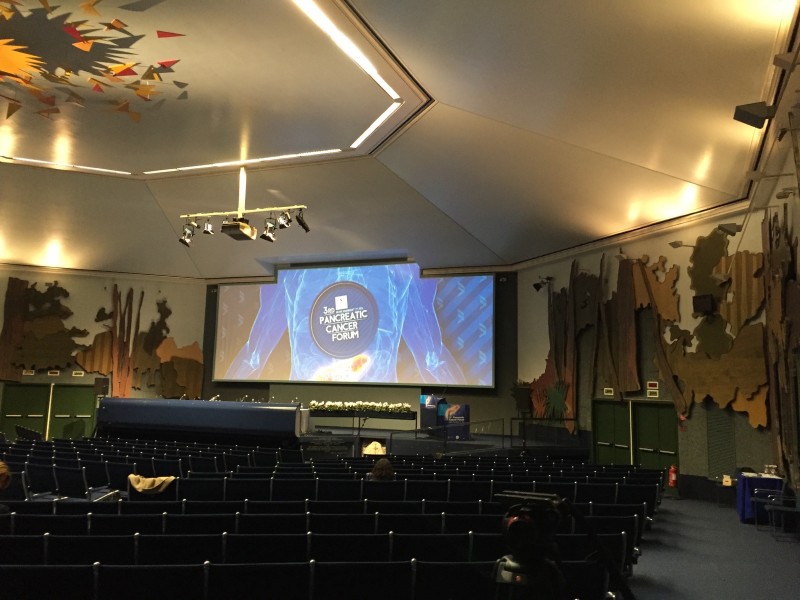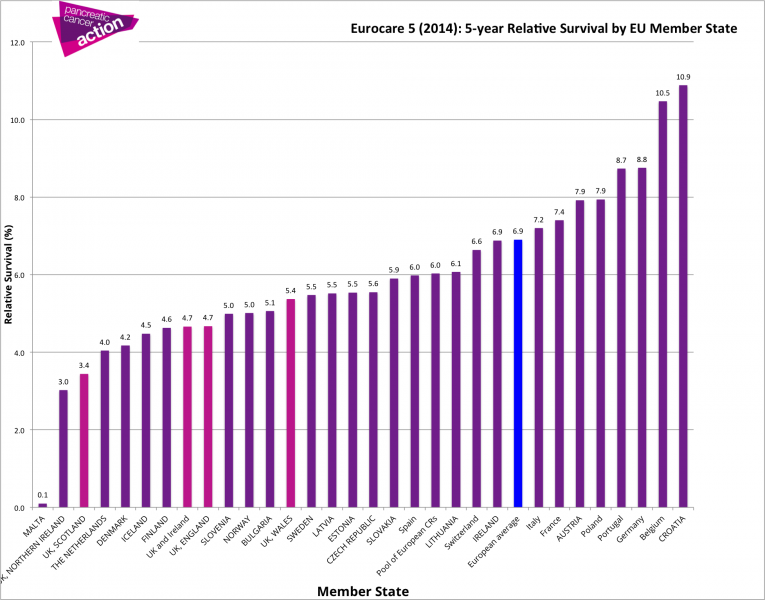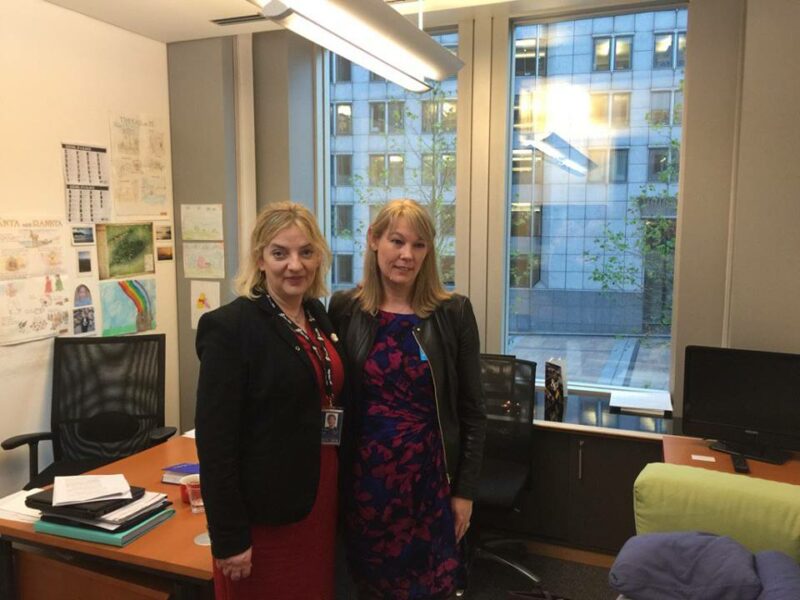Ali raises awareness of pancreatic cancer across Europe
Our chief executive and rare pancreatic cancer survivor, Ali Stunt, spent the second week of Pancreatic Cancer Awareness Month 2015, educating primary care professionals, scientists and politicians across Europe.
Here Ali shares more details of her “European Tour”.
Friday 6th November: Primary Care Society of Gastroenterology, London
At the Primary Care Society of Gastroenterology, I presented to primary care specialists with an interest in gastroenterology. While they naturally knew about pancreatic cancer, many were informed by the statistics, the causes and risks and some were amazed by the link between new-onset type-2 diabetes not associated with weight gain. This is something that can happen to patients up to 2 years before diagnosis and indeed, happened to me a year before my own diagnosis.
Many were very interested in joining with us in our research project to audit patients in primary care with a diagnosis of type 2 diabetes and a BMI of less than 25. We hope to be able to extend more widely our pilot study in 2016.
Saturday 7th November: The Pancreatic Cancer Forum, Milan

Here I presented to a conference of international scientists and clinicians from across the globe, all with an expertise in pancreatic cancer. It was a large, well-attended conference and the sheer size of the conference hall was a little daunting. I spoke about the European situation for pancreatic cancer: about how it is the fourth leading cause in cancer death in Europe and that there are vast differences in both one and five-year survival rates between countries.

Sadly, UK countries fare really badly in these league tables with some of the worst survival rates across the whole of the EU.
I also spoke about the work I have been doing with the EU Multi-Stakeholder Platform on Pancreatic Cancer; now thankfully shortened to just Pancreatic Cancer Europe www.pancreaticcancereurope.eu
The ‘Platform’ is made up of specialists, researchers and patient groups across Europe and I am the UK representative. I told the conference about the three workstreams: Awareness (which I head up), Diagnosis (of which I am a key member) and Registries. I let them know too about the outputs of those three groups – 10 key facts booklet, a symptoms poster (based on the PCA one!), a EU Parliament Declaration, a GP fact-sheet on how to spot pancreatic cancer and an update of the crucial work of the registries project – to consolidate and improve the data we hold on pancreatic cancer, its diagnoses and treatments across the EU.
My talk was very well received and afterwards many clinicians wanted to have copies of my slides for them to communicate the messages in their own countries.
Monday 9th November : European Parliament, Brussels

On Monday, I flew in to Brussels to have talks with MEPs about the work of Pancreatic Cancer Europe and also to have a meeting with with the Platform Members. The MEP meetings were to encourage them to support the Platform but also to get them to sign the declaration document to enable increased focus on pancreatic cancer in the European Parliament.
The Pancreatic Cancer Europe meeting was very productive – included the final plans for dissemination of the workstream outputs including translations into 12 languages of the key documents and an introduction of the website (www.pancreaticcancereurope.eu) and an awareness microsite for WPCD2015.
It was agreed that for 2016 there would be another Workstream for a communications function and this would be run by the European Cancer Patients’ Coalition (ECPC) of which PCA is a member. I will be heading up ECPC’s workgroup for pancreatic cancer in 2016.
There was discussion about the key focus areas for the Platform for 2016 –
- continuation of communication/dissemination of the workgroup outputs.
- collation of the European specialist centres for pancreatic cancer on the website (for patient information).
- It was discussed that a criterion should be set for exactly what constitutes a specialist centre – surgical Whipple’s throughput as one, clinical MDT, relevant palliative care pathways etc – these exist in both the UK and in Germany.
- Early diagnosis function to work with COST ACTION (EU Pancreas) to work on the key clinical areas and research priorities.
- Exploration of diabetes mellitus not associated with a metabolic condition (current work of PCA), CA-19-9 and other tumour markers.
- Palliative care pathways.
- Access to latest chemotherapy drugs.
- Encouraging other countries to take part in the registry trials.
- Patient information and resources.
Also there was discussion surrounding the governance – what type of legal entity should we be working with – as little bureaucracy as possible – clinicians having little time for this.
Wednesday 11th November: K.E.F.I patient group, Athens
I was invited by K.E.F.I – a cancer patient group in Greece to speak at their pancreatic cancer awareness event in Athens to mark World Pancreatic Cancer Day. I was presenting with a specialist surgeon, a specialist oncologist, a specialist nurse and a palliative care consultant. It appears that services for patients are not quite as joined up as they are in the UK and that some patients do not get access to all available treatments, especially palliative care and pain management.
My talk not only included my experience as a patient of pancreatic cancer but was used to disseminate the work of the Multi-Stakeholder Platform to the Greek people.
We were joined by a 10-year survivor of pancreatic cancer who was speaking for the very first time about his diagnosis and treatment. His talk was not only inspiring, but it was extremely emotional and a powerful way to put across the messages about the disease.
It’s been a long and tiring week but well worth it. The encouraging thing is that there is now a community of like-minded people who want to improve pancreatic cancer survival and the patient experience across Europe. This is the beginning but the momentum is building and building fast. I am pleased to be able to play a part in this and take it to the next level. Exciting times are ahead for pancreatic cancer awareness in Europe!
For more information on our campaigning work, please visit: https://pancreaticcanceraction.org/about/what-we-do/campaign-influence/